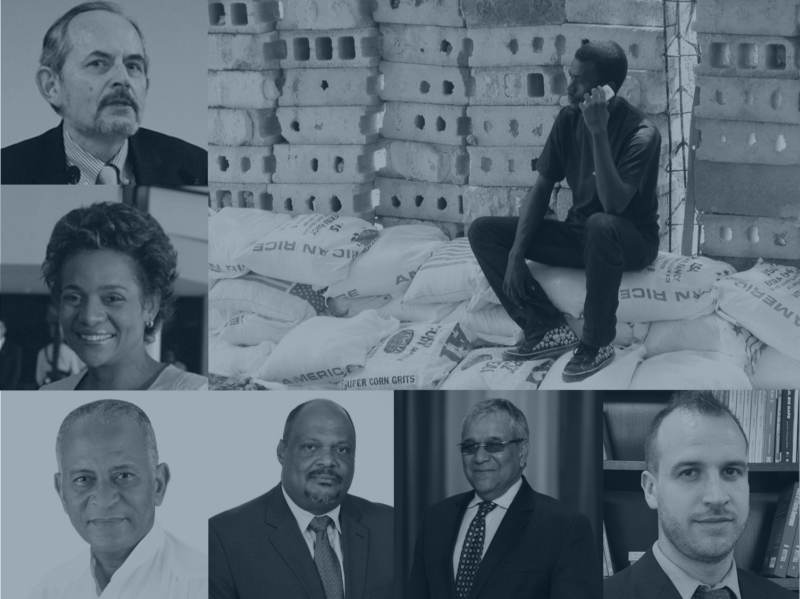New Bipartisanship Over Haiti is Promising
The sudden U.S. presidential unity on Haiti is promising, because Haiti has long been the subject of bitter partisan bickering in Washington.
This post is also available in: Français
On July 13, 2022, Think Tank Haiti, a collaborative initiative of the Inter-American Dialogue and Université Quisqueya in Haiti, hosted a webinar to discuss international aid to Haiti. Jacky Lumarque, rector of Université Quisqueya, offered opening remarks, expressing sympathy for Haitian listeners, both in Haiti and abroad, considering recent events. Daniel Dorsainvil, former minister of the economy and finance of Haiti from 2006 until 2009, presented his paper, “A Study on Where International Aid May Have Failed: The Case of Haiti.” A panel featuring Michaëlle Jean, former governor-general of Canada, Pierre-Marie Boisson, chairman of the Board of Directors of SOGESOL, and Jake Johnston, a senior research associate at the Center for Economic and Policy Research (CEPR) analyzed the paper’s findings. Georges Fauriol, a senior associate at the Center for Strategic and International Studies (CSIS), moderated the discussions.
Lumarque explained that this webinar is the first in a series of three that Université Quisqueya and the Inter-American Dialogue are organizing on international aid in Haiti. Lumarque noted that for decades private companies, international development organizations, and governments have sought to develop Haiti through various forms of international assistance. Despite this support, results have fallen short of what donors and Haitians had hoped.
Dorsainvil presented the key findings of his research that sought to answer three central questions: Why have the efforts of multilateral banks and donor governments had so little success in Haiti? To improve results, what changes are needed in the design and implementation of aid programs and projects? What can be learned from the experience of other nations and international best practices?
Dorsainvil’s comparison of Haiti’s experience with a selection of Less Developed Countries (LDCs) shows that Haiti has consistently received more foreign assistance in the form of humanitarian aid versus development-oriented aid than its counterparts. Dorsainvil referred to this phenomenon as the “humanitarian trap.” Dorsainvil concluded with the observation that the scale of aid packages to Haiti has been too small in relation to donor ambitions. The absence of clearly stated and quantifiable economic objectives with well-formulated strategies, insufficient coordination among stakeholders, and the humanitarian trap are the central reasons why international aid has failed in Haiti.
In the discussion that followed, Fauriol returned to one of Dorsainvil's concerns - notably the fact that NGOs manage a large portion of the assistance flows to Haiti - particularly in the social sector - but it appears that their efforts do not have the expected impact on overall economic outcomes. This seems to point to a disconnect between the volume of aid and the scale of NGO projects. Dorsainvil highlighted this disconnect by reminding the audience that there are at least 160 NGOs operating in Haiti that manage about 32 percent of aid packages, who work particularly in humanitarian assistance, health, and education sectors – but who are much less involved in productive sectors.
Michaëlle Jean commented on the missing link between international cooperation in Haiti and Haitian productive forces, mainly farmers. According to Jean, Dorsainvil’s study underscores the well-known fact that it is essential to include agricultural and rural communities in any development strategy or economic plan. Without their voices, their important experiences are absent from the conversation.
Pierre-Marie Boisson concurred about the effects of this exclusion. He then brought attention to the exclusion of another group from the process: investors – small, medium, and large. He added that the paper’s main conclusion is that foreign aid can produce growth if the scale is large enough. However, in his own experience, he has seen that growth generally occurs from enacting a coherent set of public policies that create and enable an environment conducive to private investment and job creation.
Jake Johnston focused on US foreign assistance and referred to the USAID webpage. He reminded the panel that donors provide aid to advance their own national security and economic prosperity. He noted, “Foreign aid assistance may not be working well for Haiti and Haitians, but it is working fine for almost everybody in Washington.” Since 2010, USAID has awarded $2.8 billion in contracts and grants, of that sum only three percent went directly to organizations and companies in Haiti.
The webinar ended with panelists’ insights on some key questions posed by the audience, including how to work with an unreliable and often illegitimate government in Haiti, and how to break the cycle of short-term humanitarian assistance when trying to solve long-term structural problems.
As noted by Lumarque in his opening remarks, Fauriol again reminded the audience that this webinar was the first in a series of three that Université Quisqueya and the Inter-American Dialogue are organizing on international aid in Haiti.
Once finalized, Daniel Dorsainvil’s study will be issued in both French and English versions.
The sudden U.S. presidential unity on Haiti is promising, because Haiti has long been the subject of bitter partisan bickering in Washington.
The worldwide outpouring of support for Haitians from governments and ordinary citizens has been extraordinary. But this heroic phase of the emergency response is drawing to a close.
After a 7.0 magnitude earthquake struck Haiti, the aftershock reached China in ways that few anticipated.The earthquake forced Chinese leaders to navigate the tricky politics of disaster relief.
 Main Image - (International Disaster Volunteers / CC BY 2.0)
Main Image - (International Disaster Volunteers / CC BY 2.0)